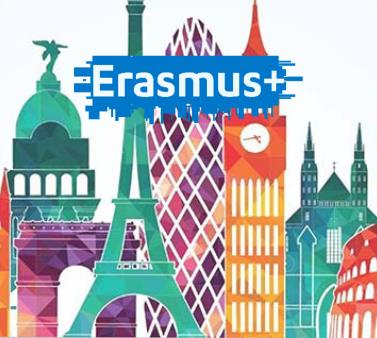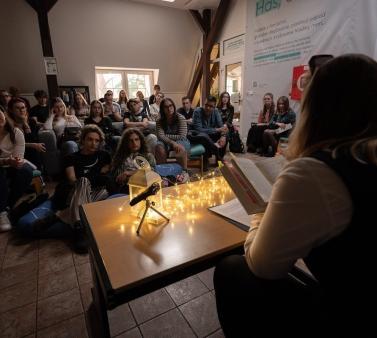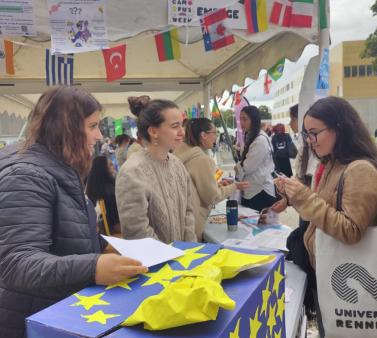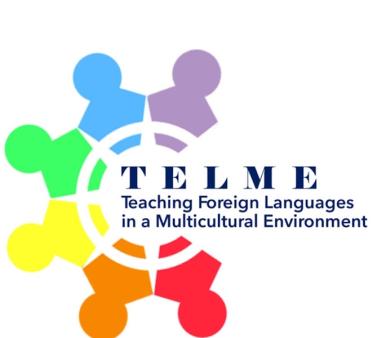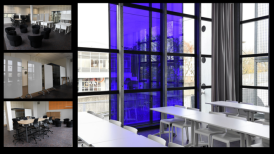
The Third Place
2 new spaces since mid-January
On January 15, 2024 the Central Library opened 2 modular and connected spaces intended to diversify work and training spaces. Whether collaborative or hybrid, these facilities have been designed and built with the aim of offering new services to users and exploring new ways of supporting research and teaching. This innovative project was developed in collaboration with central university services (the Directorate of Support for Pedagogy (DAP), Edulab), and partners (Centre de formation aux carrières des bibliothèques - Bretagne - Pays de la Loire [CFCB] and the Regional Training Unit for Scientific and Technical Information [Urfist]).
A collaborative and friendly ‘third place’
At the crossroads of a workspace on campus and a community of users carrying out actions, the third educational place promotes collaboration, inclusion, accessibility, emancipation, the dissemination of common knowledge and alternative learning. Through its equipment and regular programming of events, it is meant to contribute to the success of students and open up the facilities to a wider audience. It offers:
- a modular training space and collaborative workspaces (group work rooms including three "bubbles", for 10, 6 or 4 people / reservations can be made at: https://salles.bu.univ-rennes2.fr/),
- equipment and materials that facilitate creativity and experimentation,
- workshops and other events that promote student success and
- a herbal tea shop (reserved for speakers on prior request), perfect for organizing a moment of conviviality.
A dedicated research area
This new space, created for the Rennes research and doctoral community, complements the online services around open science offered by the University on the SOcle platform and within the Slate Data Workshop. In it, researchers and doctoral students will find all the necessary equipment to carry out their work: posts equipped with software for data acquisition and processing, two bookable meeting rooms that can accommodate up to 8 people, 1 of which is equipped for video conferences and an open conviviality space that can accommodate presentations.

The research area
The facility will also host weekly open sessions during which staff will be available to provide support on open science topics (research data, open archive repositories, online theses, etc.). Built with the support of Rennes Métropole and as part of a partnership with the Maison des sciences de l'Homme in Brittany (MSHB ), the space will also house the MSHB's Rennes Datalab office and its facilitator (as part of the CPER Open Science 2022-2027), which will also provide weekly open sessions.
The Espace des Langues: open since October
In October, 2023, the former Media Library became the Espace des langues, which promotes language-learning in an unprecedented immersive and sensory context. The project, which is composed of 4 axes - including documentation - is at the initiative of the Language Center and the Linguistics and Language Didactics Laboratory (LIDILE). The main partners associated with the center are: Scelva of the University of Rennes, the Cirefe, the Faculty of Languages, ESS CARGO and the University Library.
Co-constructed by teachers and students, the space aims to assist both groups in the study, practice, experimentation and research of languages. In it, there is:

The Espace des Langues
- an important linguistic section with manuals (printed, audio and multimedia) of all levels with exercises in grammar, magazines, dictionaries, encyclopedias, phonology and translation materials, French as a foreign language books and other language materials.
- an immersive room (opening in Fall, 2024), equipped with a 270° interactive projection. This innovative device is set to be the first of its kind opened in France. Its particularity lies in its ability to allow the interaction of up to 19 students physically present in the room with 360° resources.
- the development of an interactive and creative project called The ‘Rennes2D Virtual World’. The Virtual World represents an extension of the campus for learning and teaching and language research purposes, a significant advance in innovative didactic approaches, such as co-construction, the implementation of the co-actional approach and to-pedagogy through online interaction.


